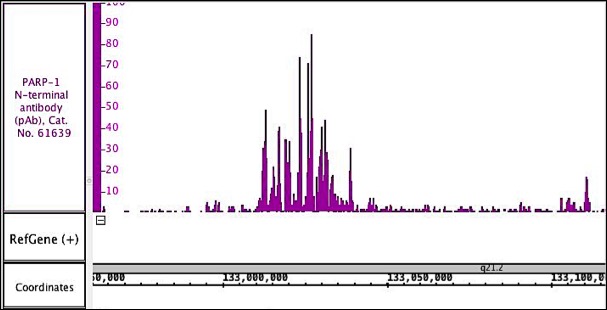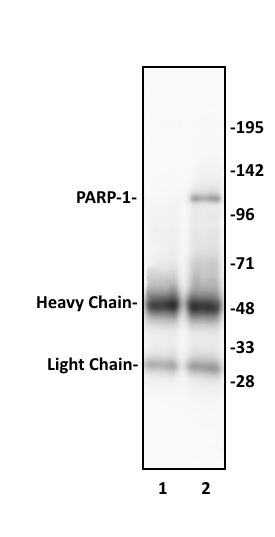PARP-1 N-terminal antibody (pAb)
Host / Isotype
Rabbit / IgG
Reactivity
Human
Applications
ChIP-Seq, CUT&Tag, IP, WB
Cat No : 61639,61640 61639
Synonyms
Validation Data Gallery
Product Information
| Tested Applications |
ChIP-Seq, CUT&Tag, IP, WB
Applications Validated by Active Motif: ChIP-Seq: 5 ug per ChIP IP: 10 ug per IP WB*: 0.2 - 1 ug/ml dilution CUT&Tag: 1 ul per 50 ul reaction *Note: many chromatin-bound proteins are not soluble in a low salt nuclear extract and fractionate to the pellet. Therefore, we recommend a High Salt / Sonication Protocol when preparing nuclear extracts for Western blot. |
| Tested Reactivity | Human |
| Host / Isotype | Rabbit / IgG |
| Class | Polyclonal |
| Type | Antibody |
| Immunogen | This antibody was raised against a His-Tagged fusion protein corresponding to the N-terminal half of human PARP-1. |
| Full Name | PARP-1 N-terminal antibody (pAb) |
| Synonyms | PARP-1 N-terminal, ADPRT, poly ADP-ribosyl transferase, PPOL, pADPRT-1, DNA damage, antibody, antibodies, polyclonal, parp, parp1, DNA damage, ribosylation, adp-ribosylation, apoptosis, pAb, polyclonal, ADPRT, poly ADP-ribosyl transferase, western blotting, wb, immunopreciptiation, ip, antibody, antibodies, sample |
| Molecular weight | 120 kDa |
| GenBank accession number | NP_001609 |
| RRID | AB_2793715 |
| Purification Method | Protein A Chromatography |
| Buffer | Purified IgG in PBS with 30% glycerol and 0.035% sodium azide. Sodium azide is highly toxic. For your convenience, a sera version (Catalog No. 39559) of this antibody is also available. |
| Storage | Some products may be shipped at room temperature. This will not affect their stability or performance. Avoid repeated freeze/thaw cycles by aliquoting items into single-use fractions for storage at -20°C for up to 2 years. Keep all reagents on ice when not in storage. |
Background Information
PARP-1 N-terminal (ADPRT) encodes a chromatin-associated enzyme, poly(ADP-ribosyl)transferase, that modifies various nuclear proteins by poly(ADP-ribosyl)ation. The modification is dependent on DNA and is involved in the regulation of various important cellular processes such as differentiation, proliferation and tumor transformation. It also plays a role in the regulation of the molecular events involved in the recovery of cells from DNA damage. Cleavage of PARP-1 (ADPRT) occurs following caspase activation during apoptosis. For additional information on PARP-1, please see the review article PARP-1: An Abundant and Ubiquitous Protein with Roles in Many Cellular Processes in the Targets & Applications section of our website.



